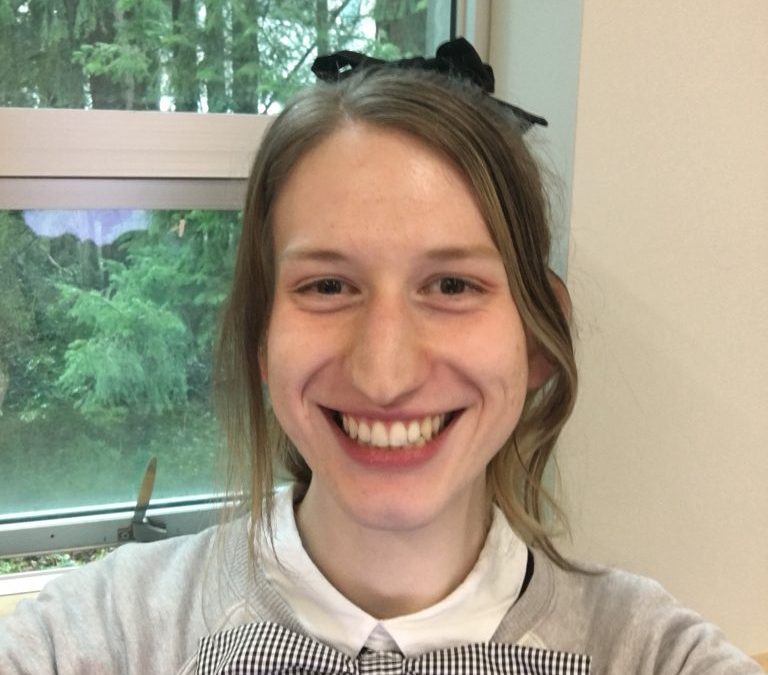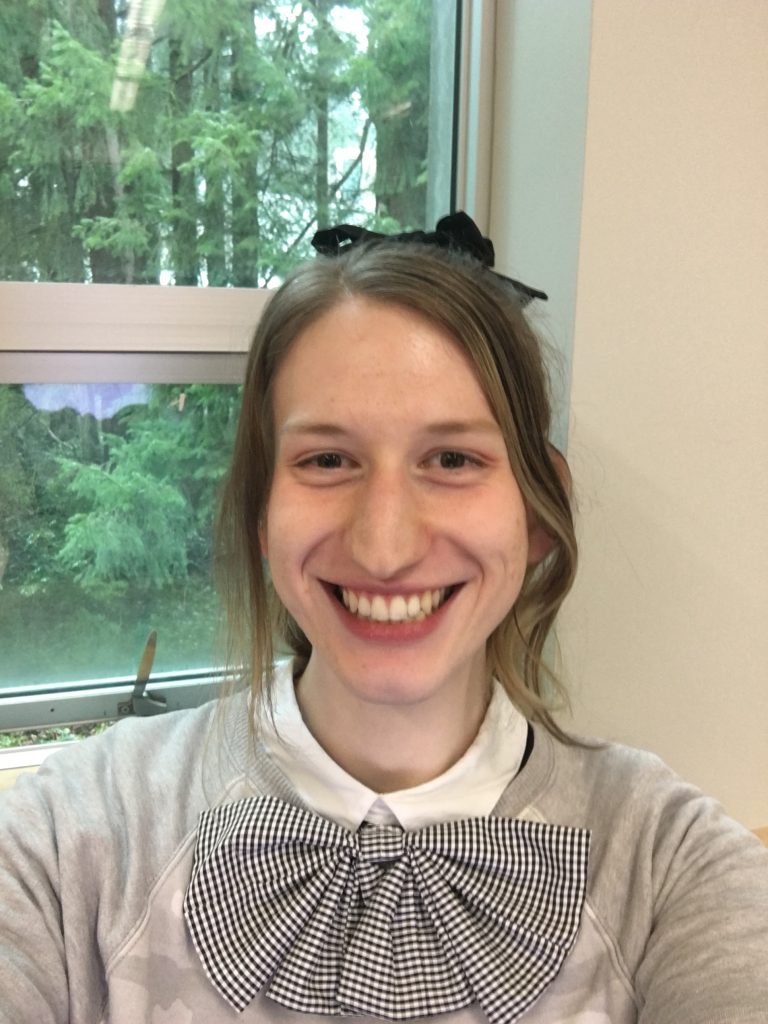
Clara Koehle
Clara Koehle is a student at Capilano University who’s major is psychology. She is the Director of Queer and Gender Resources for Social Justice Canada. She is planning to graduate in June with her Bachelor’s Degree in psychology.
Introduction
Hi, I am Clara now. I never thought I’d ever get to say that. I’ve always been ‘Clara’ but I never thought I would make it this far to be the person I am today. When you’re growing up and know you’re trans, there isn’t always a great outlook on life. When you’re alone and hear messages like “50% of trans people attempt suicide” or “If you aren’t passible enough, people won’t find you attractive” or hear about how people like you go missing or end up doing sex work, it can make being transitioning a discouraging process. However, being trans isn’t always bad. Being queer and closeted can be difficult and sometimes necessary for safety, but having the option to be an honest version of yourself should be considered, right? Coming out is a hard process but it can be rewarding. But what does it mean to be out? Why does it matter to be out? Why might someone not be out? It’s a lot more complicated than just telling people about sexual orientation or gender identity things. Being out and having visibility to show an area is safer is important (Burges, 2005)and having a sense of belonging in crucial to group belonging (Wölfer et al,. 2012)so sharing experiences can be important to developing visibility and representation.
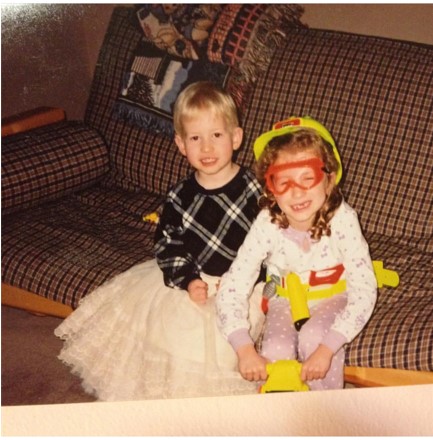
Coming Out and My Journey
For understanding my journey as a trans woman, I think its important to understand my up-brining as it explains a lot of those ‘why am I like this?’moments and provides context as to why my journey with transitioning since it’s not always a linear path.
When I was a child,I was a very sweet but stubborn kid.I loved babying my stuffies, playing dress up, and drawing.I really loved wearing lots of dresses and skirts, and layering the skirts in order of length in order to maximize the volume of whichever dress I was wearing. Regardless of wherever I was, if dressing up was an option then that’s how I would do it. That being said, I often wore my older sister’s dresses whenever she wasn’t around, which really annoyed her, but I was mostly trying to imitate the kind of clothes she was wearing to be more ‘girly’.I often did the classic egg(“egg”is a term for people who are trans but haven’t realized it yet) maneuver of wearing towels on my head to make my hair look longer and I stole my sister’s dance wigs a lot too.As stereotypical as it is to say, ever since I was little it was apparent that I was ‘different’ from other boys and generally people could notice I was a bit more flamboyant at times.
I often used those dress up times in order to escape and be someone I liked being more, and it always felt good and I was adamant about getting to dress up like that when I had the opportunity since my mom usually picked out my everyday clothes.According to my mom there was one time when I was three and I wanted to wear one rain boot and one snow boot on a field trip with my sister. We were running late and she just wanted me to pick a lane on the shoe choice, and I got SOOO upset that I(allegedly)projectile vomited everywhere while screaming, and proceeded to not wear matching shoes for about six months and barely talked to my mom within that time. She eventually bought shoes with an asymmetrical fish pattern on them which tricked me into wearing matching shoes again. There was another time in a ballet class where I was ‘the only boy’ so they wanted to be progressive and they made a ‘girl’ outfit and a “boy’ outfit so I could fit in, but my diva brain sniffed out a false dichotomy and I managed to wear both outfits while we preformed.
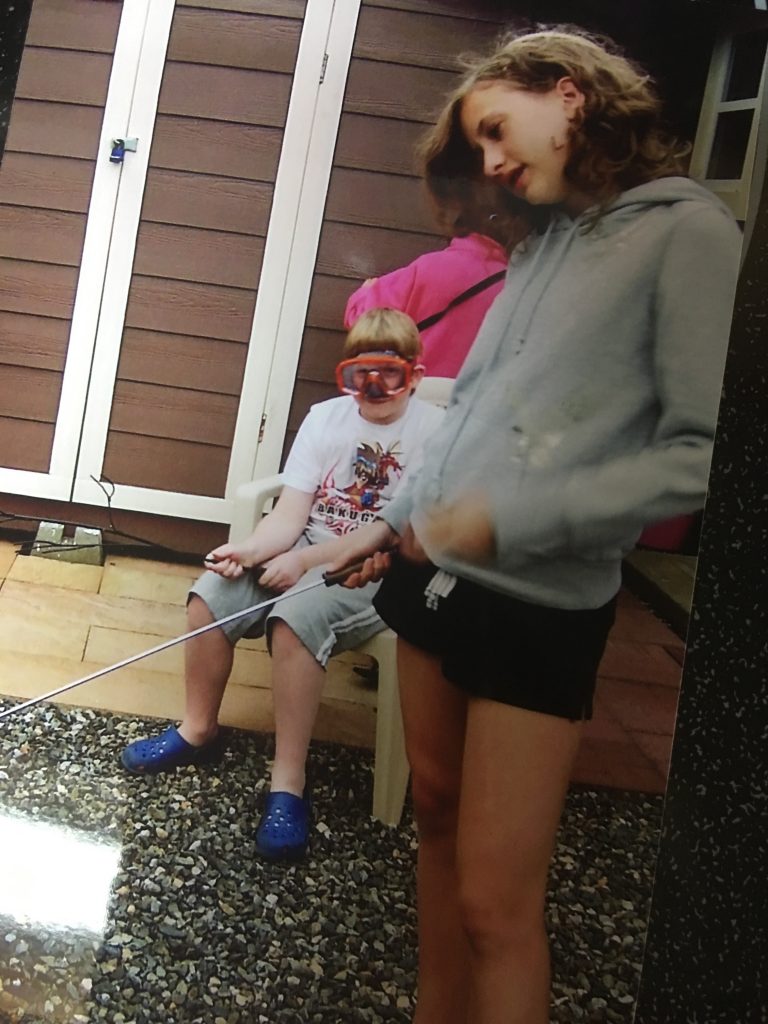
When I think back to these stories all I can think about is how much of a force I was to do what I wanted and be true to myself which makes me weirdly proud of ‘baby me’. However, when I started to get older, I started to realize that it didn’t feel as okay to like the things that I liked and on top of other traumatic things I eventually pushed that side of me away slowly. I still had all the cute and girly things I liked, but I was more reserved with how I presented. When I got to the age where my mom stopped picking out my clothes, I started to wear clothes that were more comfortable physically, like sweatpants and baggier clothes. My mental health honestly went on a downward spiral, and I gained weight, and I really didn’t like a lot of affection or physical contact from people. Around this time, I also got diagnosed with OCD and did a lot of counselling, which I managed through it but I got more and more miserable. At this point I also wanted to grow my hair out and it got fairly long butI took bad care of it and my mom had to pay me to cut my hair during the summer before entering high school. I remember cutting it really short and I used a photo reference which was a picture of my sister and I siting with my dad when we were little. In hindsight I think I was trying to go back to being like me when I was little and more confident and stable, but it made my personality fade more I think.
Luckily, during this time a had a lot of social groups I associated with and a lot of them were either nerdy, girls, and/or had mental health issues so there was a lot of solidarity. I was really lucking to have a lot of understanding female friends that were really good allies in hindsight. I remember one time when we were cleaning up after a school charity thing and everyone wanted to go to the washroom and wash their hands. Since I with my friends that were girls noticed that I waited outside of the girl’s washroom and remember them saying something along the lines, “If you want to use the girl’s washroom to wash your hands, it’s okay. The boy’s washroom is far away and you’re basically an honorary girl, so you can come in.”I think that was one of the few moments in elementary school where I felt seen by people and felt like I fit in.
By the time I was in high school I started to become more aware of sexuality and gender and puberty things which highlighted a lot of aha moments for me.I recall the majority of puberty milestones being really upsetting: the body hair, the smells, getting taller, the voice cracks, the emotional turmoil…it’s like my body had a mind of its own and I hated it. I remember having one of my first big lightbulb moments when I got my first laptop in 8th grade and googled ‘things’ with minimal discretion as most teenagers do when they have. There was this one moment when I was googling ‘things’ and in the moment, I thought to add ‘gay’ into what I was searching for. When I saw the results from my search, I had the most intense high of ‘OOOOOOHHH I LIKE GUYS AND THIS EXPLAINS A LOT!!’and after I had the low of, ‘I never want to bring this up again and I’m taking it to the grave.’Despite the amount of counselling I had done I still really didn’t trust people or like talking about issues, so I just never did. This began the era of me quietly pining over straight boys and having innocent crushes that I never acted on.
By the time 9th grade rolled around and some of the internal shame of liking guys faded but I started to want to be able to talk about it but I didn’t know how and it was hard finding people who felt safe to talk to. By this time,I met my friendEmmet(They/Them)and we became really close. Eventually, one day in our food’s class we were discussing ideas for a YouTube channel we could make since we both were into cooking and cosplay (dressing up like characters from various media). When discussing ideas of what to make and what to wear, we were on the topic of My Little Pony(It was a weird time in history when it was popular among teens lol),and I subtly made the suggestion of cosplaying as Rarity. I remember feeling layers of embarrassment suggesting it and was worried Emmet would judge me but Emmet responded with Emmet levels of enthusiasm, suggesting design concepts, how to style the wig for it, etc. and never once questioned my suggestion.
I found a video by Hannah Hart who talked about her coming out story. I remember being in my bed late at night watching it over and over and thinking about how nice it could be to talk to someone about things. This helped give me more stability over wanting to talk about sexuality things, and I wanted to talk to someone about it. I remember trying to hang out with several people and thinking that I should tell them, but for whatever reason those plans always fell through. It was discouraging but one day when I was on a walk with my sister, I thought it would be a good time to talk. We had to go to my sister’s friend’s house to drop something off and on the walk there we had to walk through a park and I remember stopping her and I said, “Chloe…I have something to tell you…”and she was calm and acknowledged what I said. I felt this immediate intense pressure on me and it was paralyzing. I paused for a few moments, took a deep breath, and said, “I’m gay I think…”She was super accepting and did all the cliché older sister things to reassure me things were okay: hugs, positive affirmations, the works.
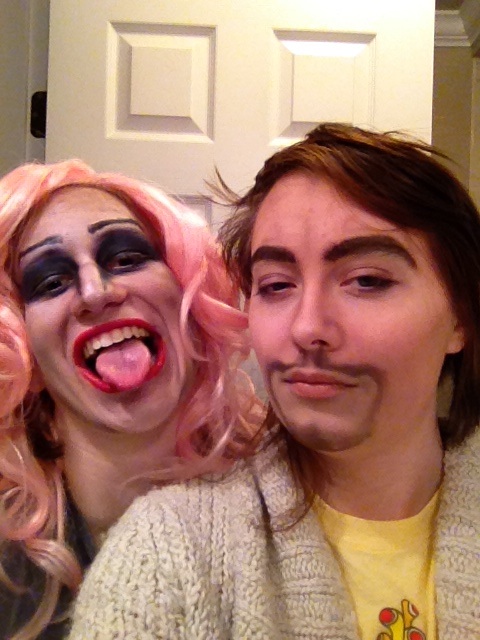
Around this time too Emmet and I both discovered RuPaul’s Drag Race and we really liked the extravagance and extra-ness of it all. I remember watching videos about drag make up and all of those things and became hyper aware of my body, which was something I wasn’t bothered by a lot. I never liked my body up until this point but my body started feeling more wrong. This is when I started to realize that I wasn’t cis gender and really didn’t like it. I tried to not think about it a lot and I started growing my hair out again to see if it would help but it wasn’t happening fast enough. I eventually went on a trip with some family friends to Jamacia and I think this is the moment where the gender dysphoria hit hard because anytime I went swimming, I always felt as if I were topless. On that trip I made a friend there and we had a huge talk one day and told her about how I was feeling. She was super accepting and we discussed transness and that I should talk to my parents about it and try to do HRT (Hormone Replacement Therapy). I vividly remember being on the plane ride home and thinking that I could tell my parents about it and that I could see someone about it right away and fix my body, but for whatever reason I just didn’t bring it up to them.
After some time, Emmet and I started learning how to do drag makeup and playing around with colours to try new things. We decided to be apart of high school musical theatre production of Aladdin and we wanted to practice makeup. Emmet took it upon themself to learn how to do Jafar’s makeup and I wanted to practice doing a little bit of eyeliner. We were in my basement bathroom and practicing our makeup and Emmet asked me something along the lines, “So, how do you identify?”I thought for a moment since there was a lot of information about myself that I was unsure about how to communicate it but I did know that Emmet was a safe person to talk to so I replied with the legendary line of, “I’m pretty sure I’m not a lesbian??”This line says a lot without saying much: It uses a feminine identifying label which implies that I don’t identify as male, that I’m not exclusively sexually attracted to women, and that I was still figuring things out.Emmet fully understood that sentiment and we were able to discuss things more.
Later that night we went upstairs since Emmet had to head out, and my mom saw us in really intense makeup. One thing I understand about my mom is that she loves me and is an accepting person, however, communication and tone aren’t her strong suit when she is caught off guard. This was one of those nights. I think I blocked a lot of the details out but I remember an intensely loud amount of confusion, concern, panic, but wanting to help? But one thing I remember is my mom asking if I was a ‘Transvestite’ with a tone my automatic response was “No, we were just dressing up and practicing makeup for Aladdin.”
Eventually, I started feeling a bit safer around people and it got a bit easier to disclose things to friends if they asked. I kind of developed ways to give compromised answers to people as a way to be somewhat honest and not closet myself while also disclosing information without using explicit labels. If people asked about my pronouns, I would often respond with something like,“I don’t mind what pronouns people use with me, I’m just me.”which was my way of saying, “Refer to me however you like because I don’t want to rock the boat by having expectations about my needs but I’m not giving the ‘okay’ to he/him pronouns but I won’t be visibly upset by it.”
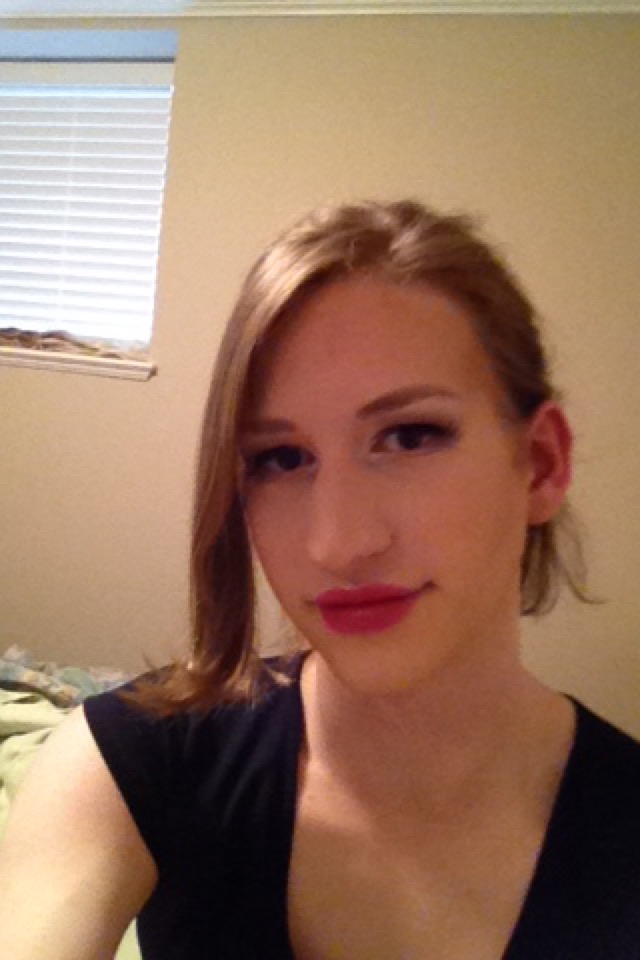
I still would wear makeup and do drag things when I would hang out with people, but one thingEmmet noticed when we would do makeup together was that my makeup was gradually becoming less and less ‘drag-y’. At this point I was more honest about wanting to be more feminine and I eventually wanted to do something about my hormones. I had my last pediatrician appointment when I was 17and I knew if I got a referral from her then it would make it easier to figure out how to get hormones. However, I hadn’t explicitly told my parents anything about my gender things other than them seeing me in drag. In classic ADHD fashion I told my mom and sister the night before my pediatrician appointment that I wanted to go on estrogen and I wanted to talk to the doctor about it. My mom freaked out a bit because it was so abrupt when I told her, but she was on board with it. She made a big deal that I told her when my dad wasn’t there, but by the time I told him he was very indifferent but supportive.
My pediatrician referred me to a gender psychiatrist and I eventually got prescribed testosterone blockers. I put off starting them because with certain HRT things it can affect fertility, so I didn’t start them until I was in the second year of university.
In this time, I learned that being non-binary is a thing and that people use they/them pronouns and can have their pronouns be respected, so I though I had more labels to work with and test out, so I started using they/them pronouns as a way to be neutral about my gender so I wouldn’t have to think about gender constantly.This was middle ground for me to have a clear way for me to communicate that I’m queer and my identity matters but I’m not 100% sure about it yet.Even though I felt weirdly secure in my gender I was still really miserable and my drinking patterns and substance use was becoming problematic, so I had to go off of my testosterone blockers since I was getting very fatigued on them. I eventually got better at managing my substance use but for whatever reason I didn’t go back onto my testosterone blockers for a while.
Once covid hit and the world went into lockdown, I had a lot more time to think about my gender and expression. I used to joke that I had two main gender expressions and those were feminine and sweatpants respectively and I had the epiphany that my expectation of what I had to do to be feminine was so high that I would burn out and wear comfortable clothes which would discourage me from dressing or feeling feminine. I thought about the performative nature of gender, and gender expression and identity not always mutually exclusive which led me to the conclusion of…‘I don’t always have to be super feminine in my appearance to be a girl.’I thought about it like the paper bag princess; the princess is still a princess regardless of the if she’s in a paper bag or a dress so why can’t the same mentality apply to me?Regardless of how I dress I know I’m a girl and I’m happiest whenI’m a girl so I want to feel like a girl all the time.When I realized that this pressure was one of the things discouraging me from taking testosterone blockers and doing more HRT, I immediately did everything I could to start it up again. I started being clearer with people that I want people to exclusively use She/Her pronouns with me, I found a better middle ground for clothes that made me feel better, and I started wearing makeup again and found I was able to look at myself in the mirror again.I eventually was able to start taking estrogen and progesterone which is basically putting me through puberty again but everytime I feel how smooth my skin is I can’t help but smile.As narcissistic as it may sound, I sometimes catch myself looking in the mirror for long periods of time and feel good about myself.
Last summer I decided to change my name to Clara since I was starting to feel the resentment of having a masculine legal name and I wanted a name that suited me more, but wasn’t too large of a change between the names. Even though in some circumstances I still use “Clarke”and respond to it, I feel detached from that name and don’t react too much to it. I really do like the name “Clara”because it makes me think of the Nutcracker since I play Mother Ginger in a production it, it provides a lot of fun confusion. I also like it as a name because it makes for fun puns.
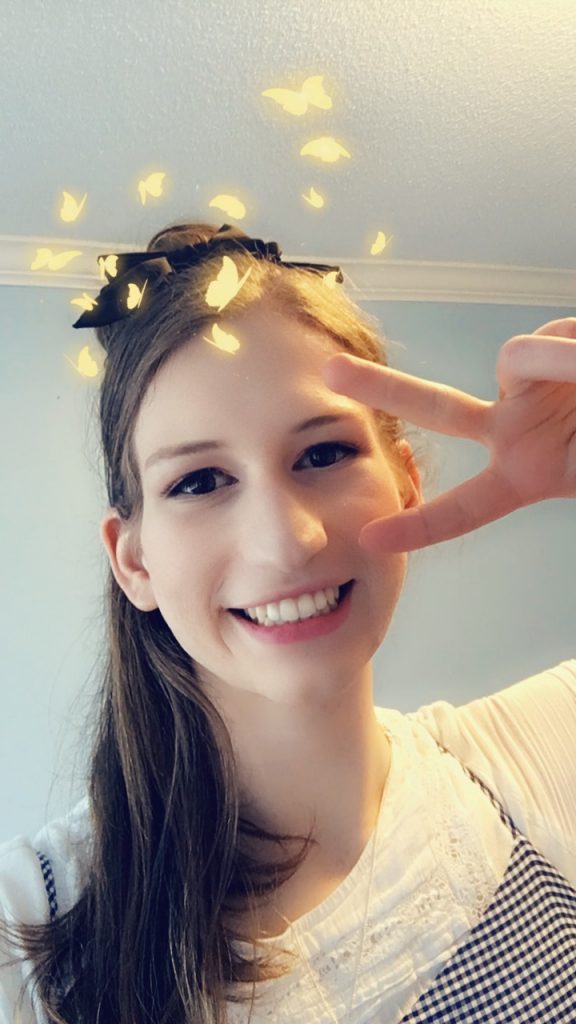
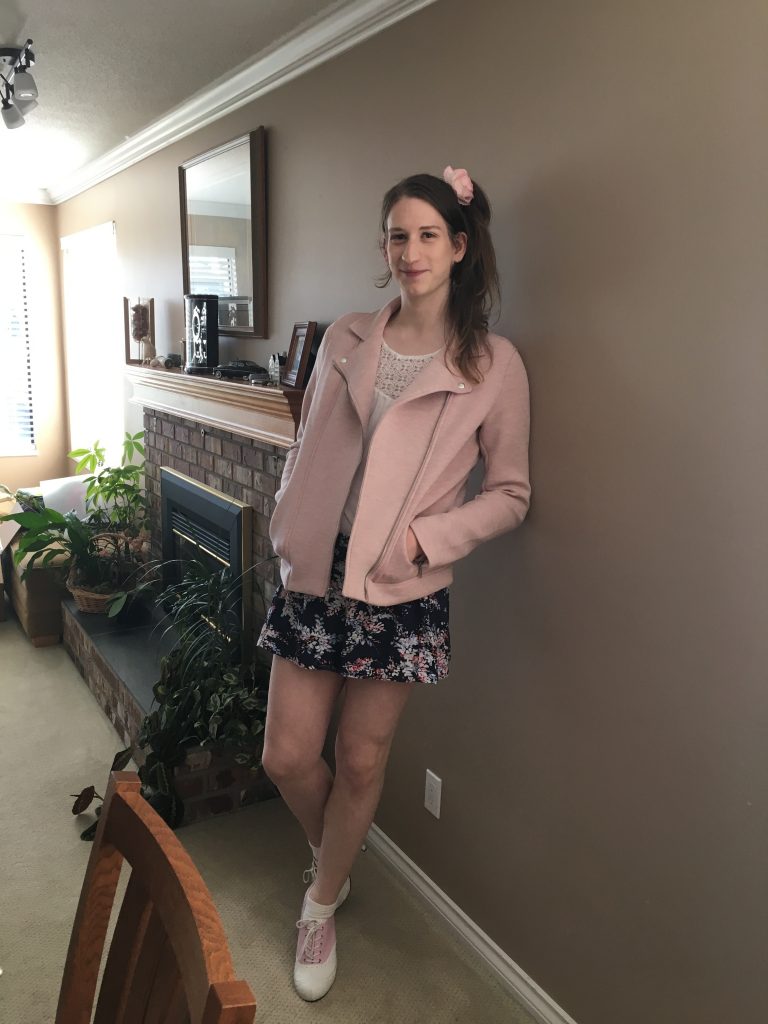
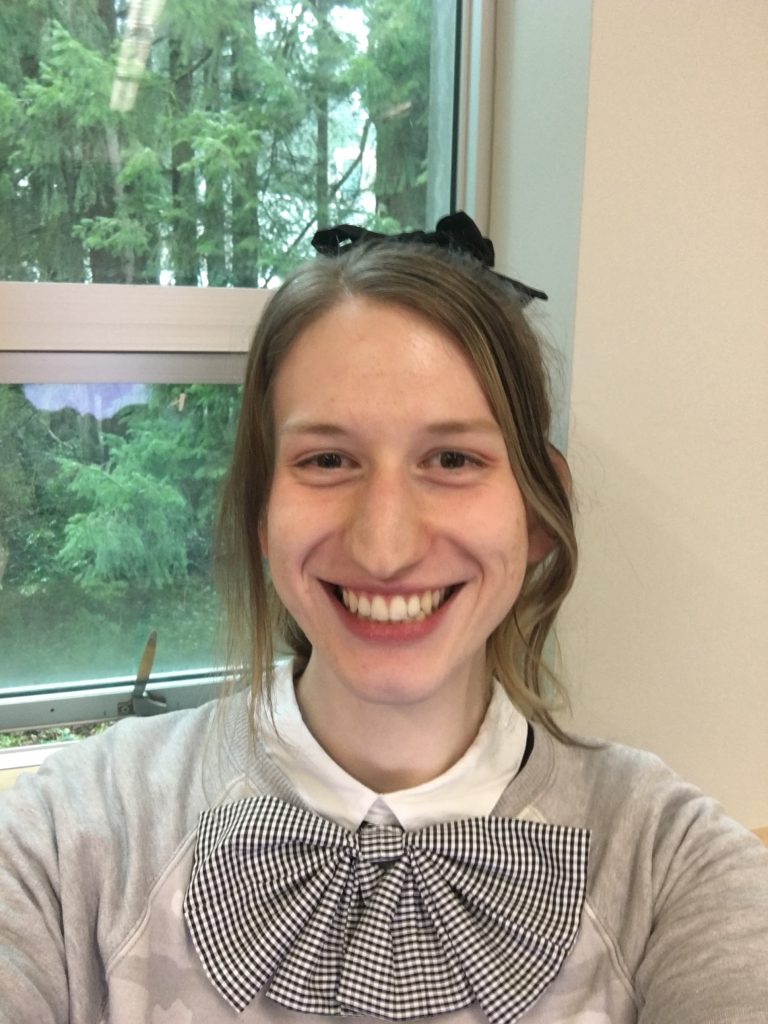
Coming Out Pedagogies
Coming out as a concept can be integral to having your identity be seen by others in queer context, right? However, the concept of coming out or how people may have their identities be seen can differ drastically from person to person. My journey as a white trans woman living in NorthVancouver current day might be different than someone who has or doesn’t have the privileges Ido. I’m a very fortunate person where my transness really wasn’t a huge shock to the people in my life, so most the “coming-out”I have done generally hasn’t been to my detriment and most people react well enough that it hasn’t threatened my safety. However, that can’t be said for everyone.
Being closeted
When discussing outness it is important to discuss why people might NOT want to be out. There are many reasons as to why someone may stay closeted or be stealthier about identity. For example, safety, cultural reasons, or they might be unsure about how they identify. If someone knows they’re queer to some degree but maybe isn’t sure if they are or don’t know how to articulate it, because its hard to come out as something if you don’t have a way to say what that is. If someone is in a situation where their livelihood and safety is at stake, then it may not be worth it to come out. Someone might not come out if there is a level of formality where information could be disclosed but isn’t explicitly necessary. For example, Nancy Powaga mentioned the CLASSIC trans and enby (a way to say non-binary which sounds like the acronym NB) experience of being told you’re in the wrong bathroom (Powaga, 2022).I don’t know about you, but if someone tells me I’m in the wrong bathroom, that’s probably not the time to disclose my transness and put my safety at risk, but it is a good time for the ‘don’t police bathroom’s conversation.’
Cultural differences
Coming out can vary a lot once there are more intersections involved, specifically with culture. The more intersections someone has with their lived experience, the more complicated it gets to navigate those influences(Hua, 2018).Khadija Mbowedid a YouTube video on coming out where she discussed a lot of coming out dynamics in regard to culture (Mbowe, 2018). She mentioned that a lot of the time when culture and queerness intersect, generally the values of the culture have more influence than queerness does (Mbowe, 2018). Generally, coming out is seen as a more western practice so the idea of someone having to sexuality things in a cultural context where sexuality isn’t talked about, then it might not make sense to bring it up (Mbowe, 2018). Khadija also mentions the idea of ‘little victories’ in of being seen, where maybe there could be a situation where one could come out and have it not go well or a situation where things aren’t necessarily talked about but people (mostly parents), can do things that show that they are accepting and that parents who aren’t perfectly accepting right away aren’t inherently bad because they have their own hoops to jump through on the path to acceptance(Mbowe, 2021).She mentioned things like her dad using the term ‘partner’ when referring to her partner as a small victory (Mbowe, 2021). I know I had a small victory thing with my dad where he saw me getting ready for a show at school that I wasn’t hyped about and he saw my make up and said “Don’t just go for pretty, drag it up, Shinx (Mydad’s nickname for me).”and it was the most ‘go play ball, kiddo’ moment I’ve ever experienced with him.
Letting people in vs coming out
There was an interesting framework heard about in an episode of Queer Eye where Karamo Brown is discussing coming out to parents with Angel and suggests the framework of letting people in instead of coming out(Brown, 2021). Karamo mentions that dynamically when people have to come out by having to tell people it gives power to reject on the person someone is coming out to, but in a letting in paradigm the power is on the individual who gets to choose who they share information with which allows someone the opportunity to see into that individual’s world(Brown, 2021).I think this frame work is a lot less pressure and takes away the obligation of having to tell people information and makes it about sharing information by chance or when it comes up.
Conclusion
Coming out and being a queer person is a complicated process.There are a lot of working parts involved with being the representation we need in the world and that’s why being open with people is integral to building a future with more representation. That’s mostly why I wanted to write a paper on this topic. I wanted to share some of my lived experience in order to show what experiences becoming who I am today in order to be a trans role model not everyone has but also elaborate on some context for coming out to express how it gets to be more complicated when more intersections get involved. I hope more queer people are able to get to live fulfilling lives and see that they can be respected without ignoring their own lived experiences.
Works Cited
Brown, K. (2021).Queer Eye. Angel Gets Her Wings[Video]. Austin, Texas: Netflix.
Burgess, A. (2005). Queering heterosexual spaces: positive space campaigns disrupting campus heteronormativity. Canadian Woman Studies, 24(2,3), 27-30.
Farmer, L. B., Robbins, C. K., Keith, J. L., & Mabry, C. J. (2019). Transgender and gender-expansive students’ experiences of genderism at women’s colleges and universities. Journal of Diversity in Higher Education. doi: 10.1037/dhe0000129ç
Hart, H. (2012).COMING OUT (Ch. 1) “So. This is me.”[Video]. California: yourharto.Retrieved fromhttps://www.youtube.com/watch?v=OZ_8O929WOA&t=1s&ab_channel=yourharto
Hua, L. (2018). Slow Feeling and Quiet Being: Women of Color Teaching in Urgent Times.New Directions For Teaching And Learning,2018(153), 77-86. doi: 10.1002/tl.20283 Locke, K., & Passchier, A. (2021).What are your words?. New York Boston: Little, Brown and Company.
Mbowe, K. (2021).Maybe you should stay in the closet?…Coming Out re-examined[Video]. Montreal: Khadija Mbowe. Retrieved from https://www.youtube.com/watch?v=8U0Nt7Egw2I&ab_channel=KhadijaMbowe
Powaga, N. (2022). The Ladies Room [Blog]. Retrieved from https://audacity.substack.com/p/the-ladies-room?s=r
Williamson, M. (1996).A return to love: Reflections on the Principals of “A Course in Miracles”. New York: HarperCollins Interactive.
Wölfer, R., Bull, H. D., & Scheithauer, H. (2012). Social integration in youth: Insights from a social network perspective. Group Dynamics: Theory, Research, and Practice, 16(2), 138–147. doi: 10.1037/a0024765
